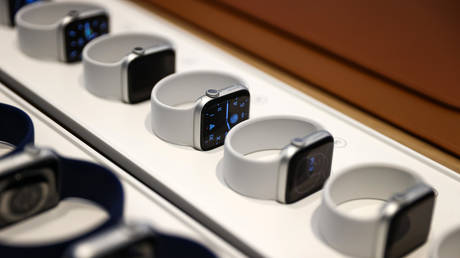
The device’s blood oxygen sensor becomes less accurate the darker the user’s skin is, a US plaintiff claims
Apple profited at the expense of dark-skinned customers by charging a premium for an Apple Watch that knowingly incorporated a defective ‘blood oxygen sensor’ feature, a class action lawsuit filed last week in New York claims.
Plaintiff Alex Morales bought his own Apple Watch between 2020 and 2021 after Covid-19 made pulse oximeters, which use infrared light to estimate the amount of oxygen in the blood, a must-have for monitoring vital signs at home. According to the suit, he assumed the feature would work “without regard to skin tone,” as Apple disclosed no “biases and defects” on the label.
But pulse oximeters have been shown in scientific studies to produce inaccurate measurements for darker-complexioned patients, due to the melanin in their skin absorbing the infrared light from the device as if it was well-saturated blood. Public ignorance of this disparity arguably contributed to the disproportionate number of Covid-19 deaths in black and Hispanic Americans compared to whites, as dangerously-low oxygen levels would have gone undetected even in a medical setting.
Citing a similar study, the New York lawsuit argued Apple’s “false and misleading representations” of its own device’s accuracy put lives at risk.
Morales sued on behalf of a group of New York State consumers who bought the $400 device during the pandemic, accusing Apple of violating the New York General Business Law and State Consumer Fraud Acts in addition to breaching its express warranty and engaging in fraud and unjust enrichment. The suit also includes customers in Alaska, Arkansas, Idaho, Iowa, Mississippi, North Carolina, North Dakota, Utah, and Wyoming under those states’ consumer fraud laws.
Apple’s blood oxygen sensor was found approximately equivalent to “medical grade” devices in an October study, though the company insists on its website that the function is “only designed for general fitness and wellness purposes,” rather than “medical use, including self-diagnosis or consultation with a doctor.”
While Apple’s own study from June found blood oxygen levels did not meaningfully differ between white and nonwhite Apple Watch users, its website does mention that “permanent or temporary changes to your skin, such as some tattoos, can also impact performance.”




